South Kanara came to South Bombay over a hundred years ago, changed the way the city approached hospitality and still continues to
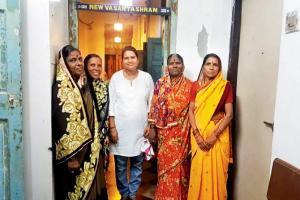
Latur activist Chaya Kakade with her women's group in Vasantashram's doorway
 I can tell they're duplicate!" he claims, voice ripe with indignation. Keshava Acharya wants his employer's reputation spotless as his white, starched dhoti. The major domo has 50 years' experience fixing a gimlet gaze on guests whose relationship status he sorts at a glance. "Duplicates" are unmarried couples.
I can tell they're duplicate!" he claims, voice ripe with indignation. Keshava Acharya wants his employer's reputation spotless as his white, starched dhoti. The major domo has 50 years' experience fixing a gimlet gaze on guests whose relationship status he sorts at a glance. "Duplicates" are unmarried couples.
Working at New Vasantashram Boarding and Lodging House near Crawford Market since he was 22, Keshava belongs to a vanishing breed of loyalists. Yadava Anchan is his counterpart at Hebbar's Heritage Home (Modern Hindu Hotel) facing Sterling Theatre. Both are assets to the Mangaloreans behind these early 20th-century establishments.
ADVERTISEMENT
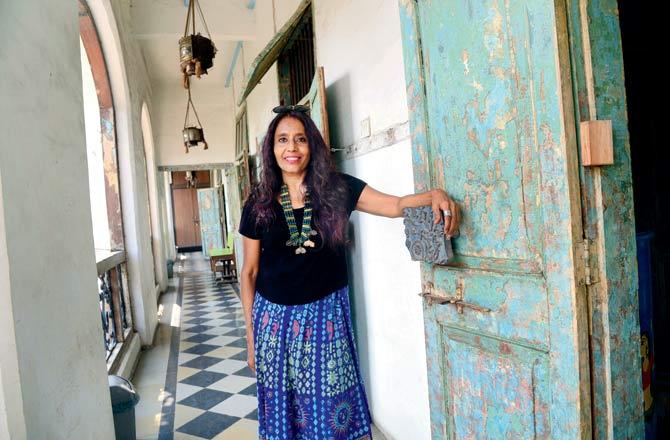
Vasantashram managing partner Sujata Pilinja Rao on the lodge's verandah overlooking a vibrant streetscape that includes the Crawford Market clock-tower, Musa-firkhana's brick facade and Taj in the distance. The door handles are innovatively adapted textile printing hand-blocks picked up from Ali Umer Street near Pydhonie
From Matunga to Fort, such homes away from home rose with Tamilians, Keralites and Kannadigas testing the city of opportunity. Landing coveted Bombay jobs, typists and stenographers from the high-literate South would alight at Dadar Station and Victoria Terminus. They were led straight to lodge accommodation by men hired to guide them.
Though Irani restaurants flourished between the World Wars, orthodox Hindus resisted meat on the menu. South Indians stepped in sanguinely with simple places providing coffee and vegetarian "tiffin", wholesome hometown food and drink. People met here, built networks, formed lifelong friendships. South Kanara families who continue to host a range of customers, paying modest tariffs from R300 to R1,200, share warm accounts.
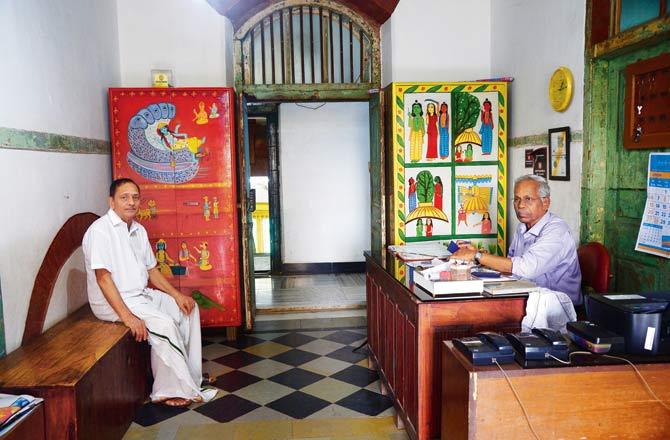
Keshava Acharya (left), supervisor for 50 years at New Vasantashram, with manager Jagannath Shetty, in the lodge's reception. The colourful Madhubani-style Mahabharata episodes, painted by one-time resident artist VK Gupta from Ghaziabad, are part of a well-conceived restorative makeover. Pics/Suresh Karkera
Unglamorous, even seedy as lodges seem, Sujata Pilinja Rao runs Vasantashram with passion. This was opened in 1947 by her father Pilinja Laxminarayan Rao, with his brother Subba Rao catering Udupi meals. Sujata says, "Stuck between being a hostel and a hotel, a lodge is the land of lost uncles, joined by others who hang thin South Indian towels and clothes on anything resembling a hook."
Visiting Vasantashram proves every bit as adventurous as Alice stumbling into Alladin's cave instead of the rabbit hole. This wonderland sprawls on the third floor of Narasinh Mansion, where elephants were tethered when the Maharani of Jaipur visited. Sujata took over as managing partner after her father's death in 2002. To discover an all-male staff bemused hearing orders from the little girl they had seen grow up, fidget during pujas, tear down their winding stairs.
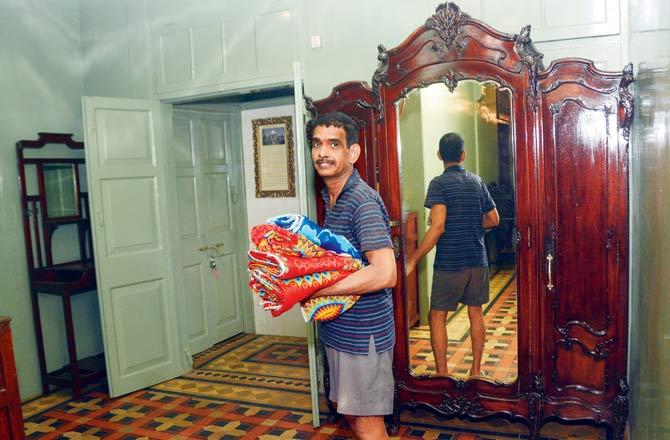
Yadava Anchan has gone about his daily chores as the general factotum at Modern Hindu Hotel for 47 years. Antique furniture pieces in common spaces, dorms and private rooms are a highlight at this lodge. Framed in the far ground is one of a series of Bombay prints like images of the Gateway, Flora Fountain and Haji Ali hung outside doors. Pic/Sneha Kharabe
Her crackling efficiency and firm sense of legacy earned respect from the staff. Bravely balancing economics with emotion, she faced chauvinism, of course. On one man repeatedly taunting Sujata to focus more on her child, she lived up to her maiden surname—Pilinja means "tiger" in Tulu. With a temper likened to hot black pepper sambar, she told him an AK-47 alone could put her down.
Dipping into her savings, the copywriter turned businesswoman actioned a cheerful overhaul. The palimpsestic restoration stripped plaster, revealing a vintage turquoise underlay, brick archways and support structure features bearing the Victorian name Geo Gahagan & Co. Sujata assigned artist-guest VK Gupta from Ghaziabad to splash canary yellow, peacock blue and parrot green folk motifs on dull Godrej cupboards and water drums. Old ladders and beams are innovatively repurposed to hang lighting fixtures. From Darukhana she bought disbanded ship lanterns which line Vasantashram's corridors and lovely, long street-facing balcony. Sujata hopes a restaurateur from gentrified Kala Ghoda soon matches her vision to operate a cosy verandah cafe encouraging conversations over coffee.
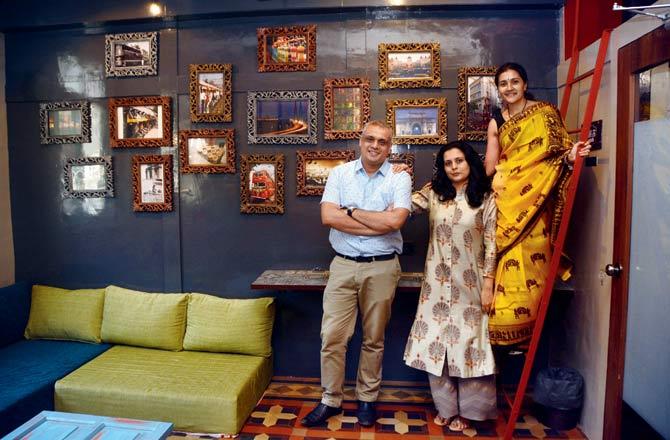
Ajit, Mrudula and Shwetha Hebbar, the third generation running Modern Hindu Hotel, opened in 1926 by their grandfather KSN Hebbar to cater to the lodging and boarding needs of textile traders frequenting the city from Chennai, Tirupur, Cochin, Erode and towns in Andhra Pradesh. Pic/Sneha KHarabe
"Vasantashram has unique floor tile designs, coloured almirahs and trunks, and unusual artefacts," says Arun Rajan of Kerala, who came to the city to assist with film festivals at Liberty Cinema. "Bombay holds chaos, yet you find your space and are integrated. This is the city's noisy heart but it also brings beautiful calm of night." His German anthropologist friend Pauline Zimnoch says, "Looking at Vasantashram on a website, I found the building very interesting with its old architecture and the lodge quite economical in the middle of the city."
A Vasantashram regular, activist Chaya Kakde from Latur was Baba Amte's aide after the earthquake. Training in Seattle with the Bill and Melinda Gates Foundation, she launched the Refresh brand of organic sanitary pads in a small unit in Pardhewadi village. Her women's group demonstrated to great effect at Azad Maidan, protesting tax on sanitary pads. "Today, there's no GST paid for sanitary towels," she says proudly. "Here for our Vichardhara Gramin Vikas Sanstha work, yeh ghar jaisa lagta hai. I recommend Vasantashram to everyone in the Police Commissioner's Office opposite the lodge and at Mantralaya."
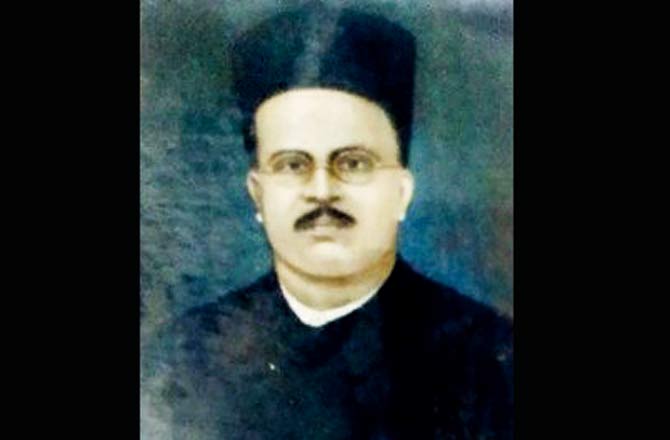
Venkappaiah Kanemar pioneered the earliest South-style hotel chain in 1912
Lokmanya Tilak Road, Vasantashram's location, was the divide between "British Bombay" and "Native Town". Miles away, a class schism resulted in Modern Hindu Hotel just beyond VT Station, at Apeejay Chambers on Wallace Street. KSN Hebbar of Kattingeri left the Vishakhapatnam hotel he worked in when its proprietor refused to give his monthly four-annas salary. Reaching Bombay, he set up Modern Hindu Hotel in 1926 with his brother's support.
"Ajja had hordes of officegoers and tourists queueing for South-spiced breakfast, lunch and dinner dishes on banana leaves," says Ajit, of his grandfather, painter KK Hebbar's cousin. KSN Hebbar gave budget-constrained strugglers subsidised board and lodging. His son Anantha Krishna, Ajit's father, singly ran the restaurant till 2010 and hotel five years later when he died. It served 250 daily customers unlimited rice, dal, vegetables, sambar, chapati, dahi, papad and pickle.
Hundreds of young men around the Hebbars' hometown got a fair start in life at Modern Hindu. Following a hard workday, they were pupils in Fort's night schools. Secure in the knowledge of a clean bed at the end of the longest day, several went on to set up their own restaurants and lodges.
Among their clientele were a Chief Justice of Mysore and SS Vasan, the founder of Gemini Studios, named for his wife's star sign and not a jackpot-winning horse as widely believed. This was where C Rajagopalachari and Krishna Menon lunched after discussing freedom politics at neighbouring Bombay Gymkhana. And from his Taj suite, the Maharaja of Mysore insisted on Modern's vegetarian fare.
Ajit says, "Cloth commission agents, traders showing samples, agents travelling to collect cash from dealers, once formed our clientele. Who does these tasks in the digital age?" He agrees, however, that online technology books streams of guests through Airbnb and MakeMyTrip. Present residents include lawyers in town for High Court case hearings, corporators from Kolhapur with their entourage, foreigner interns and students from across the country who ask, "Is it peaceful to study?" I wish two aspiring medics luck— they are immersed in much feverish revision for radiology exams.
Training police officers in digital forensics, Prajakta Pathe says, "My room is pleasant with a really nice gallery view. I have lots of public transport options to my Cuffe Parade office. With CST Station close, it's easy taking trains to Nagpur where I live. And I enjoy spending weekends in markets and museums nearby."
Flashback to the romance of a pioneer introducing South-style hotels in Bombay. Shobha G Rao speaks of her grandfather Venkappaiah Kanemar who, with his chain of Welcome Hotels, tackled language and regional barriers in a basically British industry. The August 5, 1973 issue of Bharat Jyoti describes young Venkappaiah from Mangalore, in Bombay before and after attending the 1911 Delhi Durbar of King George V. On the stopover he befriended some Coorgi soldiers strolling off-duty. They had an overwhelming grievance: no food of their taste in city hotels.
The rest is hospitality history. Shobha has a memory of her grandfather's photograph in Rama Nayak's boarding house, indicating how far he inspired generations of legendary restaurateurs. On the heels of Venkappaiah's first Welcome Hotel near Imperial Cinema in 1912 came others. The one strategically situated near GPO appears popular, considering the surge of travellers I notice check in at a rather dreary reception desk after the bright energy of Vasantashram. As Sujata there affirms, "The idea is to stay relevant and scale up, while maintaining the spirit of what lodging is supposed to be about—community and affordability."
Author-publisher Meher Marfatia writes fortnightly on everything that makes her love Mumbai and adore Bombay. Reach her at meher.marfatia @mid-day.com/www.mehermarfatia.com
Catch up on all the latest Crime, National, International and Hatke news here. Also download the new mid-day Android and iOS apps to get latest updates
 Subscribe today by clicking the link and stay updated with the latest news!" Click here!
Subscribe today by clicking the link and stay updated with the latest news!" Click here!







